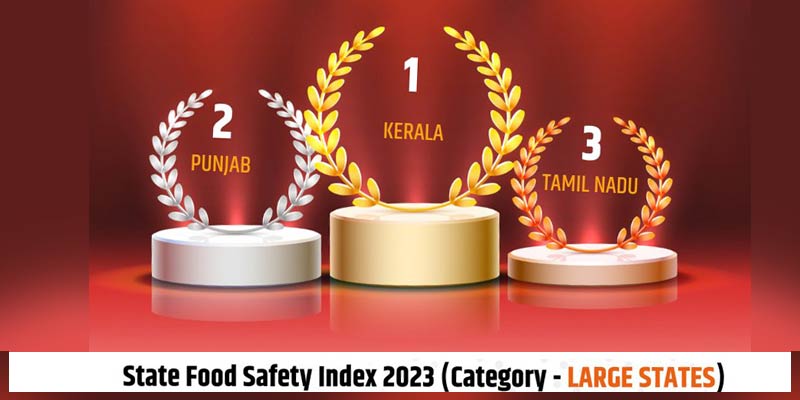- India
- Jun 09
Kerala tops FSSAI’s State Food Safety Index
• Kerala topped the State Food Safety Index released by the Food Safety and Standards Authority of India (FSSAI). Punjab stood in the second position followed by Tamil Nadu among large states.
• Among small states, Goa stood first for the fourth time in a row. It was followed by Manipur and Sikkim.
• Last year, Tamil Nadu was at the top position, followed by Gujarat and Maharashtra.
How is the Index prepared?
• The FSSAI releases the State Food Safety Index (SFSI) annually for each financial year on June 7, on the occasion of World Food Safety Day.
• The Index is a dynamic quantitative and qualitative benchmarking model that provides an objective framework for evaluating food safety across all states/UTs.
• The First State Food Safety Index was released on June 7, 2019 based on the information submitted by states/UTs. FSSAI has successfully maintained information on food safety parameters over time using different online platforms.
• The states/UTs are categorised into Large States, Small States and Union Territories.
This index is based on performance of state/ UT on significant parameters.
They are:
i) Human Resources and Institutional Data
ii) Compliance
iii) Food Testing Infrastructure
iv) Training & Capacity Building
v) Consumer Empowerment
vi) Improvement in SFSI Rank.
Food Safety and Standards Authority of India (FSSAI)
• The Food Safety and Standards Authority of India (FSSAI) has been established under Food Safety and Standards Act, 2006 which consolidates various Acts and orders that have hitherto handled food related issues in various ministries and departments.
• The FSSAI is a statutory body established under the ministry of health and family welfare.
• FSSAI was created for laying down scientific standards for food articles and to regulate their manufacture, storage, distribution, sale and import to ensure availability of safe and wholesome food for human consumption.
The main functions of FSSAI include:
• Setting globally benchmarked regulations, standards and guidelines.
• Facilitating compliance through licensing, registration, inspection and improved laboratory network.
• Building capacity of regulatory staff as well as food business operators.
• Driving public health initiatives in the true spirit of convergence.
• Leveraging IEC (Information, Education & Communication) and BCC (behaviour change communication) techniques to build a food safety culture.
• Embracing technology to streamline processes.
• Forging strategic partnerships to generate and exchange knowledge and best practices.
Manorama Yearbook app is now available on Google Play Store and iOS App Store


